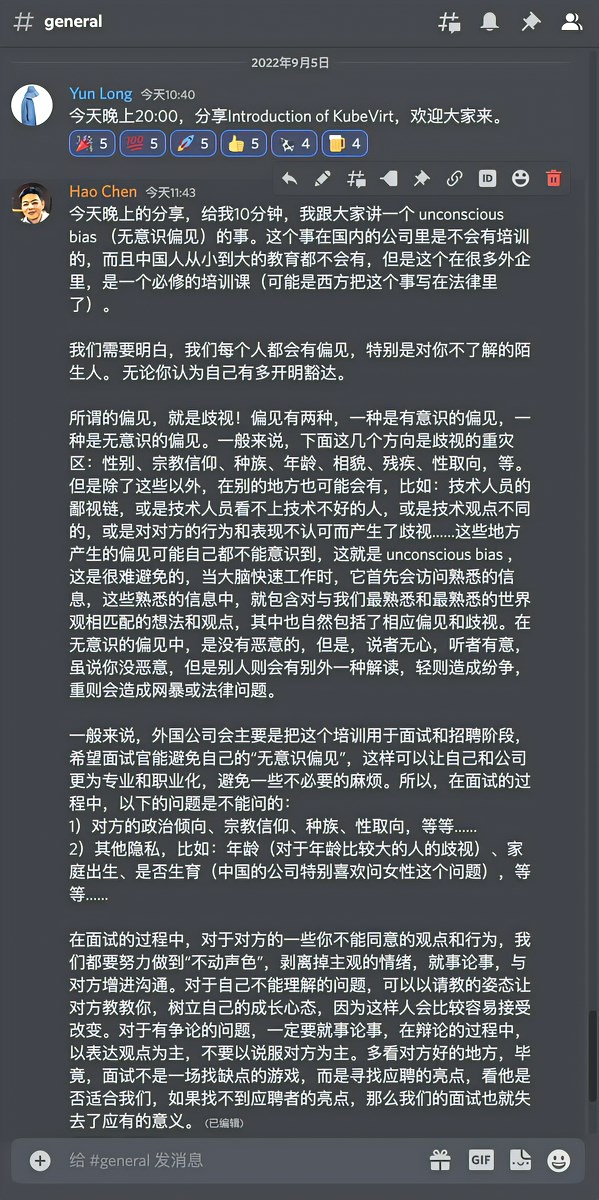Original link: http://catcoding.me/p/unconscious-bias/
Recently saw Hao Chen share unconscious bias on Twitter, Hao Chen on Twitter: “Unconscious Bias

This is indeed a compulsory course in foreign companies, and it is a part of the training that is focused on when Microsoft is hired. A diverse and inclusive workplace requires employees to pay attention to these details.
“Unconscious bias” was new to me before my training, but in retrospect I actually experienced it.
I am reminded of one thing from the former company. At that time, we were working on enterprise IT security and solving corporate data security issues. Our security related teams have had some discussions and I need to document this stuff. One of them is the safety management of employees. Our conclusion at that time is that for outsourced personnel, management needs to be emphasized, because the quality and safety awareness of outsourced personnel are poor, and the personnel turnover is high, so the data they are exposed to needs to be graded and so on.
These are all things we discuss, so I wrote about it on our team’s Conflence page. I just finished editing (I guess he found it by looking at the recently edited page by accident), an outsourcing employee sent me a private message, and the words revealed anger, who said that the quality of the outsourcing personnel is poor?
I realized at once that writing this way has done him a lot of damage. Later, the employee resigned. I am not sure whether it was because of this incident that led to his resignation, but I am sure that outsourcing will feel all kinds of invisible discrimination in the company.
Not only my former company, but I have also seen various treatment of outsourcers from many other companies. For example, they are in the same office, but holiday gifts and cultural shirts are only available to employees, and so on. Of course, from the perspective of the company, we need to save costs, but from the perspective of working environment and caring for people, we should strive to reduce the harm of prejudice to people.
In fact, unconscious discrimination is very common, mainly because people are used to labels and inertial thinking. For example, when an HR screens a resume, one of his most basic screening conditions is education, major, etc., which can quickly make judgments, which may be mainly for efficiency. When HR expands the screening conditions to age, region, gender, etc., we usually feel that it is too much, but these rules have been operating invisibly in society.
People are usually impressed by their experiences of being discriminated against, but if you are a discriminator, you will be unaware of your own discriminatory behavior, and most people will have difficulty finding themselves with habitual prejudices. As the mouse said, prejudice not only causes harm to others, but also hinders one’s own cognition and progress. For example, technical prejudice, if you ignore the application scenarios and requirements and talk about the technology stack, you will let your prejudice unconsciously dominate and make bad choices.
I think prejudice mainly kills curiosity and thirst for knowledge. When you put on an opposite label, you think you know enough, and you lose curiosity and motivation to know.
No one will be an unbiased person unless he throws away all the summaries of life experience, but the habit of looking at people and things as objectively as possible is worth cultivating, and it will benefit others and yourself.
This article is reproduced from: http://catcoding.me/p/unconscious-bias/
This site is for inclusion only, and the copyright belongs to the original author.